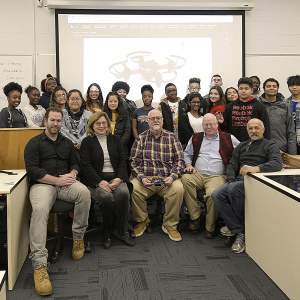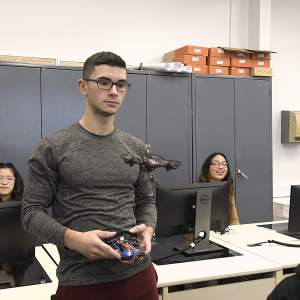This item was published more than 1 year ago. For a current list of press releases, visit News Archives .
Tunxis Community College in Farmington recently hosted the Engineering Technology Challenge for 25 students from Hartford High School.
Offered through the College of Technology’s Regional Center for Next Generation Manufacturing (RCNGM), the program ran over the course of five Saturdays from Oct. 26 to Nov. 23 with a goal of piquing students’ interest in careers in engineering, technology, and manufacturing, and helping them experience what it’s like to attend college.
The high school juniors and seniors were immersed in many activities that integrated professional skills, team building, technology, 3-D design, technical writing, and math, taught by several CT Community College faculty. During the sessions they learned how to program drones which they flew in trial runs at the end of the program. They had assignments with deadlines, and received stipends which were connected to their participation, attendance and other factors to help connect the experience to career-level work.
“The students were able to learn professional skills while coding drones that are used in many advanced technology applications,” said Tunxis professor Dr. Karen Wosczyna-Birch, director of the College of Technology and executive director of the RCNGM. “They have learned valuable skills that have prepared them well to continue their education and become our next generation of innovators and leaders.”
In its fourth year, the Engineering Technology Challenge program is funded through a National Science Foundation grant, and has been offered to more than 1,000 students at several city high schools since its inception.
The Regional Center for Next Generation Manufacturing (RCNGM) is one of seven National Science Foundation (NSF) Advanced Technological Education Centers in the United States. The RCNGM is led by the College of Technology at Tunxis Community College, a consortium of all 12 CT Community Colleges and eight public and private universities that was formed through CT legislation in 1995 to establish seamless pathways in engineering and technology. Among its goals are to bring together educators and industry, and to be responsive to workforce needs in Connecticut. It also provides seamless career pathways for students to earn certificates, associate of science and bachelor of science degrees in engineering and technology disciplines, with no loss of credit upon transfer. For more information on the College of Technology, contact Dr. Karen Wosczyna-Birch at 860.723.0608, or [email protected].
Tunxis Community College in Farmington offers more than 70 associate degrees and certificates, including 27 associate degrees and certificates with science, engineering, math, technology and manufacturing emphases.Tunxis is also the recipient of a $2.4 million National Science Foundation grant that established the College of Technology’s Regional Center for Next Generation Manufacturing, an NSF Center of Excellence. For more information on programs at Tunxis, call 860.773.1490, or visit tunxis.edu.


